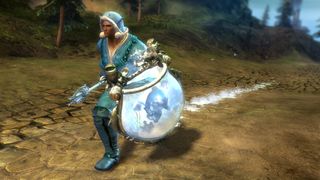
“BRUTOR WITH A RIFTER,” began a classified ad I posted in EVE Online one Friday night, looking to advertise my services. “I have a ship. It has some guns on it. And I have little regard for my own safety. Pay me, and I’ll use them to shoot at whatever you want. All offers considered.”
I was a fairly low-level character with some experience in mid-scale PvP as a tackle ship, a tiny frigate that keeps bigger ships from being able to warp away. But I hadn’t played in over two years, my corporation had booted me, and I was just looking to have some fun and make some cash blowing up spaceships. What followed was one of the most entertaining nights of gaming I’ve ever had in an MMO.
I got hired onto a small, ad-hoc pirate crew led by a cheerful Frenchman who loved to drag newbies into his little criminal underworld. We jumped out to nullsec (EVE’s open PvP area where the NPC space cops won’t save you) to raid some player-run mining freighters and split the take between us.

With their scale and permanence, MMOs give us the chance to be citizens in a make-believe world we create with the help of our fellow players.
We were a scrappy pack, flying junkers held together with arts and crafts supplies. We had to hide constantly from any of the bigger alliances' capital ships that prowled through the system looking for just our breed of ne’er-do-wells. When we did manage to gank a miner under-equipped to deal with our hit-and-run tactics, we didn’t even have enough cargo capacity to haul back everything of value that was left in the wreckage. More than half was abandoned to drift in space and eventually despawn. All this to make just enough money to maybe upgrade our engines to something slightly less junky.
My time with that crew is special to me. I’ve rarely gotten so much enjoyment out of being a small part of a larger, player-driven world. Unfortunately, most massively multiplayer games these days don’t offer anything like it.

How MMOs usually kill this kind of simple joy
The biggest MMOs in the world encourage everyone to follow the same path. Quest for glory. Be the hero. Slay the dragon and wear its mandible as a hat that looks just like the dragon mandibles everyone else is wearing. Black Desert Online and Guild Wars 2 may have polished, well-written quest content, but they aren't immersive ecosystems where you have to find a niche and fight for an honest (or, in my EVE crew’s case, rather dishonest) living. Most MMOs are more like singleplayer games where lots of people are sharing the same play space and can sometimes team up to defeat a challenge.
In World of Warcraft: Legion, you’re 'The Guy.' You’re the protagonist that the entire world revolves around, surrounded by hundreds of others who are being sold the same story—without much room to wriggle out of it. If you want to play a different role in the universe, you pay the price of having fewer systems for you to do that sustainably and enjoyably. And the experience for other players is worse for it—instead of a rich, living society that takes all types to run, everyone is the proverbial Luke Skywalker in a sea of legendary Jedi masters.
The biggest gaming news, reviews and hardware deals
Keep up to date with the most important stories and the best deals, as picked by the PC Gamer team.
Sure, EVE Online has its Luke Skywalkers—the hot shots leading vast armadas and flying death-defying missions to turn the tide of PvP wars—but they got there by fighting, lying, stealing, befriending, or buying their way through a simulated society. Becoming a hero is meaningful in EVE because the community itself decides what's heroic.
As a lowly buccaneer in EVE, I was more like a Han Solo. I was broke. I had some very powerful people who wanted to blast me into space dust for ganking their corp-mates. I got by only on luck, quick thinking, and a lack of scruples. I didn't make history, but I had ownership over a fantasy and identity that I'd built myself.

Games like WoW have tried to flesh out crafting and professions, but your cooking or smithing quests are only ever a side show.
It's true that games other than EVE have allowed players to pick unheroic, even mundane paths over epic heroism—and have fallen very flat in the attempt. In the early days of Star Wars Galaxies, players and entire guilds devoted themselves to hunting bounties, crafting, and even dancing. The problem was that these interesting niche professions were still built into a framework where combat and questing were the assumed main course. These traditional MMO activities got most of the development time. Twirling your twi’lek head-tails for tips was a largely passive experience that only the most devoted roleplayers could maintain an interest in over the long-term.
Today, massively multiplayer games have largely hit a creative slump in an era when publishers have come to realize they’re not going to out-WoW World of Warcraft. What the genre needs to pull out of its tailspin is to look at these facets beyond traditional questing and raiding with the assumption that they are core playstyles in themselves. Games like WoW have tried to flesh out crafting and professions, but your cooking or smithing quests are only ever a side show. They’re assumed to be something you’re going to devote yourself to in addition to killing the world-eating bad guys and saving Azeroth. Anyone who tries to level solely through professions, while it can provide an interesting novelty for spectators, is ultimately treated like a second-class citizen by the core systems.
Star Wars Galaxies failed, but it failed because it never truly made the junk dealers and the wookiee groomers feel like valid, valued participants in its systems. In PlanetSide 2, the entire battlefield is filled with individual grunts doing their small part to drive the spectacle of a huge, epic war—which makes moments of ace piloting or infantry leadership that much more impactful. And in other games, those moments of heroism aren’t even necessary. There are massive communities devoted to driving virtual big rigs loaded with gravel across Arizona. In hardcore Arma communities like ShackTac, helicopter pilots might taxi teammates for hours during a mission, never firing a shot.
My aspiring EVE scoundrel never became rich or famous. He was never anyone’s hero. But that wasn’t his story. And because of that, his successes and failures meant so much more. His moments of triumph were always far from assured. He wasn’t put on a track designed to end with him vanquishing Raidboss Doomlord XVIII and watching a cutscene about how awesome he was for following a prescribed path. Massively multiplayer devs need to be reminded how rewarding it can be to live the life of a scoundrel, with no assurance of success no matter how hard you try.
With their scale and permanence, MMOs give us the chance to be citizens in a make-believe world we create with the help of our fellow players. When it’s left up to us what kind of role we want to fill in that world, everybody’s immersion benefits from being surrounded by all types of characters with vastly different stories. And the tales we swap around a campfire or a pitcher of Space Beer are all the more rich and interesting when, unlike the death of Raidboss Doomlord XVIII, which is up on YouTube already from 30 different perspectives, no one has ever heard them before.
Most Popular




